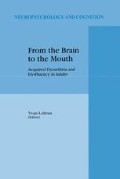Abstract
Stuttering is a speech disorder which typically begins in childhood, usually between the ages of 2 and 5. Occasionally, however, stuttering is also observed for the first time in adulthood. In the latter case the stutter appears often secondary to acquired brain damage. Sometimes it is also a side effect of medication or it may be of psychogenic origin related to some form of psychological stress. In order to distinguish between the two conditions, stuttering which has its onset in childhood is often called developmental stuttering while stuttering originating after the typical childhood period is called acquired stuttering.
Access this chapter
Tax calculation will be finalised at checkout
Purchases are for personal use only
Preview
Unable to display preview. Download preview PDF.
References
Alajouanine T., Castaigne P., Sabouraud O., Cotamin F. (1959) Palilalie paroxystique et vocalisations itératives au cours de crises épileptiques par lésion intéressant l’aire motrice supplementaire. Revue Neurologique 101: 685–697.
Arseni C., Botez M., (1961) Speech disturbances caused by tumours of the supplementary motor area. Acta Psychiatrica et Neurologica Scandinavia 36: 279–299.
Cooper E.B. (1983) A brain-stem contusion and fluency: Vicki’s story. Journal of Fluency Disorders 8: 269–274.
Cooper E.B., Cooper C.S. (1990) Cooper personalized fluency control therapy Revised. Arnhem, Boek-en 1eermiddelencentrale.
Eisenson J. (ed.) (1958) Stuttering. A symposium. New York, Harper and Row.
Erickson R.L. (1969) Assessing communication attitudes among stutterers. Journal of Speech and Hearing Research 12: 711–724.
Goodglass H., Kaplan E. (1972) Boston diagnostic aphasia examination (BDAE). Philadelphia, Lea and Febiger.
Guillaume J., Mazars G., Mazars Y. (1957) Intermédiaire épileptique dans certains types de bégaiement. Revue Neurologique 96: 59–61.
Graetz P., De Bleser R., Willmes K. (1992) De A kense afasietest. Nederlandstalige vercie. Lisse, Swets & Zeitlinger.
Helm-Estabrooks N., Yeo R., Geschwind N., Freedman M., Weinstein C. (1986) Stuttering: disappearence and reappearence with acquired brain lesions. Neurology 36: 1109–1112.
International Phonetic Association (1974) The principles of the international phonetic association. London, IPA.
Jones R. (1966) Observations on stammering after localized cerebral injury. Journal of Neurology, Neurosurgery, and Psychiatry 29: 192–195.
Lebrun Y., Bayle M. (1973) Surgery in the treatment of stuttering. In Lebrun Y., Hoops R. (eds.) Neurolinguistic approaches to stuttering. The Hague/Paris, Mouton: 82–89.
Mazars G., Hecaen H., Tzavaras A., Merienne L. (1970) Contribution à la chirurgie de certains bégaiements eta la compréhension de leur physiopathologie. Revue Neurologique 122: 213–220.
Mazzucchi A., Moretti G., Carpeggiani P., Parma M. (1981) Clinical observations on acquired stuttering. British Journal of Disorders of Communication 16: 19–30.
Miller A.E. (1985) Cessation of stuttering with progressive multiple sclerosis. Neurology 35: 1341–1343.
Orton S. (1927) Studies in stuttering. Archives of Neurology and Psychiatry 18: 671–672.
Quinn P.T., Andrews G. (1977) Neurological stuttering-a clinical entity? Journal of Neurology, Neurosurgery, and Psychiatry 40: 699–701.
Riggs J.E., Nelson L.J., Lanham J.Ë. (1983) Reemergence of stuttering after focal cerebral insult. Archives of neurology 40: 260.
Riley G.D. (1972) A stuttering severity instrument for children and adults. Journal of Speech and Hearing Disorders 37: 314–322.
Rosenbek J., Messert B., Collins M., Wertz R.T. (1978) Stuttering following brain damage. Brain and Language 6: 82–96.
Travis L.E. (1931) Speech pathology. New York, Appleton Century.
Van Riper C. (1971) The nature of stuttering. Englewood Cliffs N.J., Prentice-Hall.
Editor information
Editors and Affiliations
Rights and permissions
Copyright information
© 1997 Springer Science+Business Media Dordrecht
About this chapter
Cite this chapter
Van Borsel, J., Cappaert, V. (1997). Aggravation or Recurrence of Pre-Existing Stuttering Following Brain Damage Suffered in Adulthood. In: Lebrun, Y. (eds) From the Brain to the Mouth. Neuropsychology and Cognition, vol 12. Springer, Dordrecht. https://doi.org/10.1007/978-94-011-5776-6_11
Download citation
DOI: https://doi.org/10.1007/978-94-011-5776-6_11
Publisher Name: Springer, Dordrecht
Print ISBN: 978-94-010-6438-5
Online ISBN: 978-94-011-5776-6
eBook Packages: Springer Book Archive

